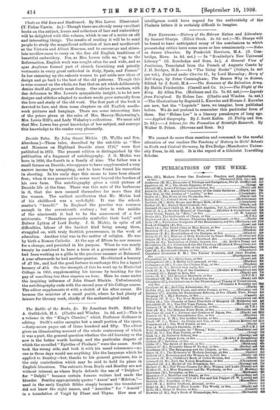Deeside Tales. By John Grant Michie. (D. Wyllie and Son,
Aberdeen.)—These tales, described by the sub-title as "Men and Manners on Highland Deeside since 1745," were first published in 1872. The present edition is distinguished by the publication of a fragment of autobiography. J. G. Michie was born in 1830, the fourth in a family of nine. The father was a small farmer on Deeside, who appears to have supplemented a very narrow income by smuggling, and to have found his recreation in shooting. In his early days this seems to have been almost free ; when it was preserved he never went beyond the borders of his own farm. The autobiography gives a vivid picture of Deeside life at the time. There was this note of the barbarous in it, that the men amused themselves far more than did the women. The earliest recollection that Mr. Michie had of his childhood was a cock-fight. It was the school- master's "benefit" In England the practice was common enough in the seventeenth century ; but in the middle of the nineteenth it had to be the amusement of a few aristocrats. "Dauntless gamecocks symbolise their lord," said Bulwer Lytton of Lord Derby. J. G. Michie, in spite of all difficulties, labour of the hardest kind being among them, struggled on, with truly Scottish perseverance, in the work of education. Another trial was in the matter of religion. He was by birth a Roman Catholic. At the age of fifteen he saw reasons for a change, and persisted in his purpose. When he was nearly twenty he contrived to have a term at a grammar school. He had been working as a gillie in the previous summer at Balmoral. A year afterwards he had another quarter. He obtained a bursary of £7 10e., and had the good fortune to exchange this for a lapsed bursary of £14. On the strength of this he went up to Marischal College in 1851, supplementing his income by teaching for the pay of something less than sixpence an hour. Here he came under the inspiring influence of John Stuart Blackie. Unfortunately the autobiogiaphy ends with the second year of his College course. The editor supplements it with a sketch of his after career. Ho became the minister of a small parish, where he had plenty of leisure for literary work, chiefly of the archaeological kind.










































 Previous page
Previous page